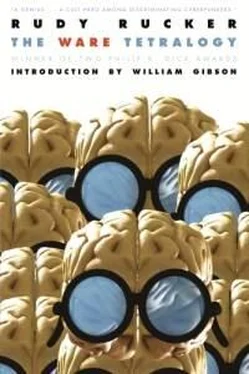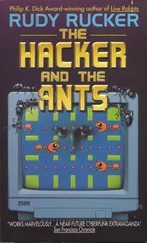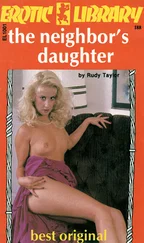Rudy Rucker - The Ware Tetralogy
Здесь есть возможность читать онлайн «Rudy Rucker - The Ware Tetralogy» весь текст электронной книги совершенно бесплатно (целиком полную версию без сокращений). В некоторых случаях можно слушать аудио, скачать через торрент в формате fb2 и присутствует краткое содержание. Год выпуска: 2010, Жанр: Киберпанк, на английском языке. Описание произведения, (предисловие) а так же отзывы посетителей доступны на портале библиотеки ЛибКат.
- Название:The Ware Tetralogy
- Автор:
- Жанр:
- Год:2010
- ISBN:нет данных
- Рейтинг книги:5 / 5. Голосов: 1
-
Избранное:Добавить в избранное
- Отзывы:
-
Ваша оценка:
- 100
- 1
- 2
- 3
- 4
- 5
The Ware Tetralogy: краткое содержание, описание и аннотация
Предлагаем к чтению аннотацию, описание, краткое содержание или предисловие (зависит от того, что написал сам автор книги «The Ware Tetralogy»). Если вы не нашли необходимую информацию о книге — напишите в комментариях, мы постараемся отыскать её.
The Ware Tetralogy — читать онлайн бесплатно полную книгу (весь текст) целиком
Ниже представлен текст книги, разбитый по страницам. Система сохранения места последней прочитанной страницы, позволяет с удобством читать онлайн бесплатно книгу «The Ware Tetralogy», без необходимости каждый раз заново искать на чём Вы остановились. Поставьте закладку, и сможете в любой момент перейти на страницу, на которой закончили чтение.
Интервал:
Закладка:
Normally when Phil would imagine the future, he’d see a single mental movie of himself going ahead and doing something. But now, thanks to Josef, he was seeing his immediate future as—oh, a mansion with many rooms. In some of the rooms Tashtego and Daggoo zoomed down on Cobb and rousted them, but in a few of the rooms Cobb swam on undisturbed.
They zigzagged across the harbor from coral head to coral head. At one tricky point, Josef’s vision showed them as apprehended in all the futures but one. So they picked the one, which meant that Cobb suddenly dove down to the bottom of the water and burrowed into the mud. A bit later the futures started opening up again. Cobb swam in close to the shore and lurked beneath one of the docks of Neiafu until there came a moment when nobody was looking that way.
Cobb disgorged Yoke and Phil, who scrambled onto the dock. Yoke used her alla to quickly make them some bland shorts and T-shirts. She and Phil walked up the dock’s gangplank to Vava’u, looking like ordinary yachties come ashore for a bit of sightseeing. Cobb waited in the water, and Josef hung from Yoke’s earlobe like a cunning gem.
They looked at the few small, utterly nontouristy stores, closed for Sunday. Canned food, rope, straw fans, rubber thongs, pieces of cloth. The early afternoon sun was quite hot. A few Tongans walked slowly by, polite and handsome, dressed in their best clothes. Last night Kennit had told them that church could be an all-day proposition in Tonga. Phil could hear a congregation’s voices lifted in song somewhere off in the distance.
“Let’s go in here,” said Yoke, indicating a small, blue-painted wood building: the Bounty Bar. They sat down by a window; at the next table were two tipsy wharf-rats, one a dark-skinned Fijian, one a pale New Zealander. Yoke ordered ice cream and Phil had a Coke.
“Listen,” whispered Yoke after a minute. “They’re talking about Onar!”
“Typical American, a loudmouth, always bragging,” the New Zealand Kiwi was saying. “A real name-dropper, mentioned HRH. He was asking what’s the most valuable and marketable element, pound for pound. What would you guess, Nuku?”
“Hundred dollar bills!” said the Fijian.
“Oh that’s no good, you silly bugger. Every bank note has a DIM in it; each and every one of them is registered with the Gimmie like a pedigreed dog. You can’t just make up serial numbers for bills that don’t exist. I said what’s the most valuable element, meaning primitive chemical substance, don’t you know.”
“Carbon!” said the Fijian. “In the form of a very big, very beautiful diamond.”
The Kiwi made a negative, fishlike face. “Bottom’s dropping right out of the diamond market, it is. I hear Mbanje DeGroot’s selling a bulk nanomanipulator that makes the price curve linear instead of exponential. No, my friend, the top four elements are rhodium, platinum, gold, and palladium. The market for palladium and rhodium’s a bit thin and illiquid, and platinum’s a shade high-profile. I told Onar that gold’s the best bet. Metals are safe from all that nanotech fiddling, don’t you know. There’s no way to convert one kind of element into another, is there?”
“How about black people eating white people?” The Fijian grinned, showing his sharp teeth. And then their next round of drinks arrived.
“So where is Onar?” Phil asked Yoke.
“Well!” said Yoke. “When Cobb and I came up from meeting the aliens at the bottom of the ocean, I suddenly realized that I didn’t have to deal with Onar anymore. I mean, here he’d gotten me to do something really dangerous, and like why? I don’t owe anything to him. He was trying to get me to give him the alla, and I was all ‘Go to hell.’ “ Yoke paused and looked at Phil round-eyed over a spoonful of vanilla ice cream.
“And then?”
“Cobb and I ditched Onar and flew back to Nuku’alofa. But I still wanted to look around Tonga, you wave. I mean I came here to do some diving. And I guess Onar uvvied the King, because the King called me up and said he’d let me use his island in the Vava’u harbor if I’d please just use my alla to make him some gold and imipolex. So I’m like why not. But it’s not working out well. I might have to bail on Tonga pretty soon.”
“Back to San Francisco?” asked Phil. “I just got here. The ticket cost a lot. There’s still so much for us to do and see.”
“Maybe back to the Moon,” said Yoke. “I should show the alla to my family and friends back there. It’s such a radical change. Too big to discuss on the uvvy. But you’re right, Phil, I’d like to enjoy Tonga some more with you.”
“If you leave, please take us with,” said Josef out loud, his little voice deep and strong.
“I don’t know about that,” said Yoke. “Six aliens? Where’s your new node anyway?”
“Oh, it’s on Vava’u,” said Josef. “Somewhere.”
On the way out, Phil and Yoke asked the cashier about the local sights.
“You might like the singing at the church up the road that way,” said the woman behind the counter “But that walk’s all in the sun. And they’re nearly done. If you go the other way it’s shady, and in a mile you come to Mount Talau.”
“How tall is Talau?” asked Phil.
“One hundred thirty-one meters,” said the woman proudly.
“I can handle that,” said Yoke.
They walked along under strange tropical trees, trees like Phil had never seen before: some with ferny leaves and masses of orange blossoms, some with purple flowers, some with doughy-looking trunks. Josef kept quiet, letting them enjoy themselves. They walked by a school and many little houses. The road petered out and became a dirt track. They passed a stripped, rusted-out car with a solemn goat standing inside it. A little farther on, a muddy trail led up a steep hill: Mount Talau. They scrambled to the top; there were a lot of trees up there and a bit of a view. The great open sea. They kissed for a while. Phil loved the smell and feel of Yoke. And her bold eyes. Looking around the hilltop, Phil found a giant bean pod hanging down from a tendril that vanished up above into some high trees.
“That’s a serious bean,” said Yoke. It was a lovely pale green and nearly three feet long.
Phil tried to snap the bean loose. He twisted the fibrous vine, bent it back and forth, but it wouldn’t give. Finally he chewed the tough stem in two. The bean had a wonderful curve to it, and it bulged out in seven great pouches around its hidden seeds. It was like a bean in a fairy tale or a comic strip. Phil and Yoke laughed about it a lot.
On the walk back down, Josef suddenly told them to duck around behind one of the native’s houses. Peeking around the corner, Phil saw a bronze moldie go racing by, running up the road on foot. He was a shaped like a muscular man, though he was wearing a woman’s red bikini.
“Tashtego,” breathed Yoke.
“ Malo e lelei,” said a voice behind them. It was an old man walking across the yard from another house. His shirt had several buttons missing, many of his teeth were missing as well, and he was carrying a small aluminum tub holding a big fillet of fish. He struck up a conversation with Phil and Yoke, talking about his sister in California. His name was Lata. Phil asked Lata about the bean he’d found.
“ Lofa bean,” Lata told him. “If you wait and pick when it’s ripe, you can use the seeds for—dancing.”
“I think he means castanets,” said Yoke, clicking her fingers.
Lata invited Phil and Yoke into his house to look at his seashells. They took off their shoes, sat on his couch, and Lata brought out his trove, a little plastic bag containing shells wrapped in paper. The shells looked shiny and well-loved, as if the old man had gathered them and admired them over many years.
Читать дальшеИнтервал:
Закладка:
Похожие книги на «The Ware Tetralogy»
Представляем Вашему вниманию похожие книги на «The Ware Tetralogy» списком для выбора. Мы отобрали схожую по названию и смыслу литературу в надежде предоставить читателям больше вариантов отыскать новые, интересные, ещё непрочитанные произведения.
Обсуждение, отзывы о книге «The Ware Tetralogy» и просто собственные мнения читателей. Оставьте ваши комментарии, напишите, что Вы думаете о произведении, его смысле или главных героях. Укажите что конкретно понравилось, а что нет, и почему Вы так считаете.











